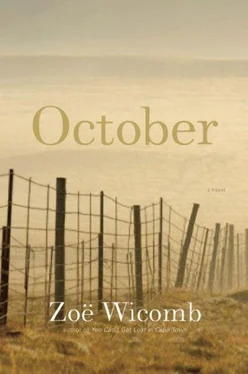Mercia knows it is inconvenient; nevertheless, she arrives early at Smithy’s. She promises to keep out of the kitchen, where there is mayhem with the smoke alarm ringing. Instead, she will help with getting the children bathed and ready for bed. The children are disappointed that she did not see lions or elephants in Africa. Not even a monkey. No, but she has seen a tortoise, and for a bedtime story tells them Achebe’s fable about the leopard and the tortoise. Which they don’t think much of. Little Ross says that she is mistaken. Making marks in the sand, scribbling, is not the same as writing, no wonder leopard doesn’t understand what tortoise is up to. He, Ross, has been learning to write proper letters, capitals and lowercase. Unlike his sister, who cannot even write her own name.
Over dinner Mercia gives Smithy and Ewan an edited version of her time in South Africa. She will have to go back at Christmas, she explains, to sort out Jake, who hopefully by then would have recovered, but she omits her father’s monstrous story and glosses over her expectations of adopting Nicky. Smithy says she is relieved that Mercia has not taken any rash decisions; she worried that Mercia might be bullied into foolish plans for Nicky. Would it not be better for the boy to be taken on by someone closer by so that he doesn’t lose touch with his mother? Some people, she says, are born to be aunties, which Mercia finds wounding. Born to be, rather than choose to be? But that is not worth pursuing.
They offer no information about Craig’s baby, so that it is Mercia who dutifully asks after her. They haven’t seen her yet, so are unable to answer any questions, Ewan says, but they hope, when mother and child come out of hospital, to go round with a wee gift.
Mercia has no idea where it comes from, does not have time to wonder whether it is the word gift that unleashes her words, but as if jolted by its entry, she straightens her back to speak. She hopes that Smithy will help, act as intermediary. She has decided to sell the flat and let Craig have his half of it.
Ewan shakes his head. No need for that, he says emphatically. Why not take Craig’s word for it: he doesn’t want anything, doesn’t want you to be uprooted or inconvenienced in any way, which earns a sardonic smile from Mercia. Living as he does with Morag — that grand apartment in Kelvinside was left to her by her parents — he has no need of the place. Besides, as Craig says, it was your deposit that enabled the two of you to buy the flat. Half the monthly mortgage that Craig put into it was less than paying rent, which would have been the case if he hadn’t shacked up with you. He is the first to acknowledge that.
But Mercia is adamant. She cannot resist a sarcastic hope that Craig’s modest tastes will allow him to live in such splendor, but no, jokes aside, she hopes not to have a distasteful conversation with Craig about money. She has thought about this carefully, she lies; she is determined to sell and it is only fair that he should have the proceeds, which after all are legally his. The apartment is registered in both their names so it is not a gift, she stresses. The deposit is neither here nor there, but if he insists, she’ll subtract it from the profit. She trusts that Ewan and Smithy will deal with Craig on her behalf. When Craig left, she explains, giving up the flat made him feel better, less blameworthy about dumping her, but now that all that has settled, everything fallen into place, now that there is a baby, he will see that guilt or blame is inappropriate.
Mercia castigates herself. She should not so thoughtlessly have accepted his settlement, but she imagines that with a new baby the money will come in handy. Now, she says, it is her turn to feel better, to draw a line under all that lively past. The apartment on Elgin Terrace is, like the many places they visited together, a place of the past, a place that no longer carries meaning for her. Phew, that’s all sorted in one mouthful hey, Mercia chuckles self-deprecatingly. Tomorrow, when I put the flat on the market, it will no longer be my home.
And where will you find a new home? Are you going back to live in Cape Town after all? Smithy asks.
Mercia says that it’s unlikely, that she doesn’t know. She hasn’t thought that far. It hardly matters, she laughs. You know what a tortoise I am.
Actually, Smithy says, I don’t. You’ve lived here in the West End for twenty-four years. And what, by the way, have you done with your shell?
Mercia looks bewildered. Really? Twenty-four years? As if she did not know. Well, I’ll have a look at the estate agents’ tomorrow, at what’s on offer here, or perhaps on the south side, but the sale will take some time. I’d like something smaller, more manageable. Rent if necessary. Give myself time to see what crops up.
Something crops up the very next day in her e-mail. A message from Tim, her head of department, urging her to sign up for the university’s personal development advisers’ training session entitled “Facilitating Interactions.” Every department is now required to have a PD adviser, and after her sabbatical she would be the ideal person, writes Tim without a trace of irony. Mercia howls with laughter. What kind of people dream up such hog-wash? The training session may well be hilarious, but Tim cannot seriously believe that she’d come back with a party bag of self-help tips for her colleagues. She could make them up without going: to facilitate interaction, behave like a decent human being and do not throw eggs at your interlocutor.
Mercia presses the reply button and writes, Fuck off, Tim. But stops herself from sending it. Instead, she reaches for the “save” option, and wishes that like female protagonists in novels she accidentally pressed “send,” with the entire department copied in. If only she could pack in the job, go somewhere where she does not know the language, somewhere where there is no possibility of interaction, where she can’t read the script — China or Japan. And again, the very next day, something crops up in her e-mail. An advertisement for a professorship at the University of Macau. Christ, you’d swear she’s skipped into a fairy tale. Just as well she’s given up on the memoir. Who would believe that it’s for real? But anticipating a third visitation, she receives no further e-mail surprises. Unless the old-fashioned letter in Craig’s hand counts as something that crops up. Mercia tosses it into the bin, unread, then spends too much time prowling around the bin, begging herself not to succumb. She retrieves the letter, holds it to the light, ascertains that it is a single folded sheet of A4 paper, before savagely snipping at it with a pair of scissors. It is not enough. She would not put it past her, in the early hours, to reassemble the pieces. So once again she retrieves most of the scraps and with newspaper sets them alight in the grate. For a few seconds a homely fire flares in the hearth.

Mercia has been shortlisted for an interview. Which doesn’t mean that she knows what she wants, she assures Smithy, but she may very well go, remove herself from the flat where in the small hours she hears Craig pacing up and down, burping a baby.
Oh well, a job offer could come in handy as leverage for promotion at our hallowed place of learning, says Smithy. But Mercia is adamant. That would not be her reason for going all that way to an interview.
No, of course not, Smithy says. That’s not the way of a citizen of the world. Mercia starts. Have they, Smithy and Craig and who knows who else, been making fun of her? She must not be paranoid; she cannot afford to lose her friendship with Smithy, so she laughs it off.
Together they lark about, poring over a map. Neither of them has a clear idea where Macao is. Or Macau. Have these people not made up their minds as to what to call their place? Smithy asks. But that appeals to Mercia. Shows a healthy attitude to their place, their home as either this or that. Is it a country? A city? They Google the place, and one of the entries lists Camões.
Читать дальше













